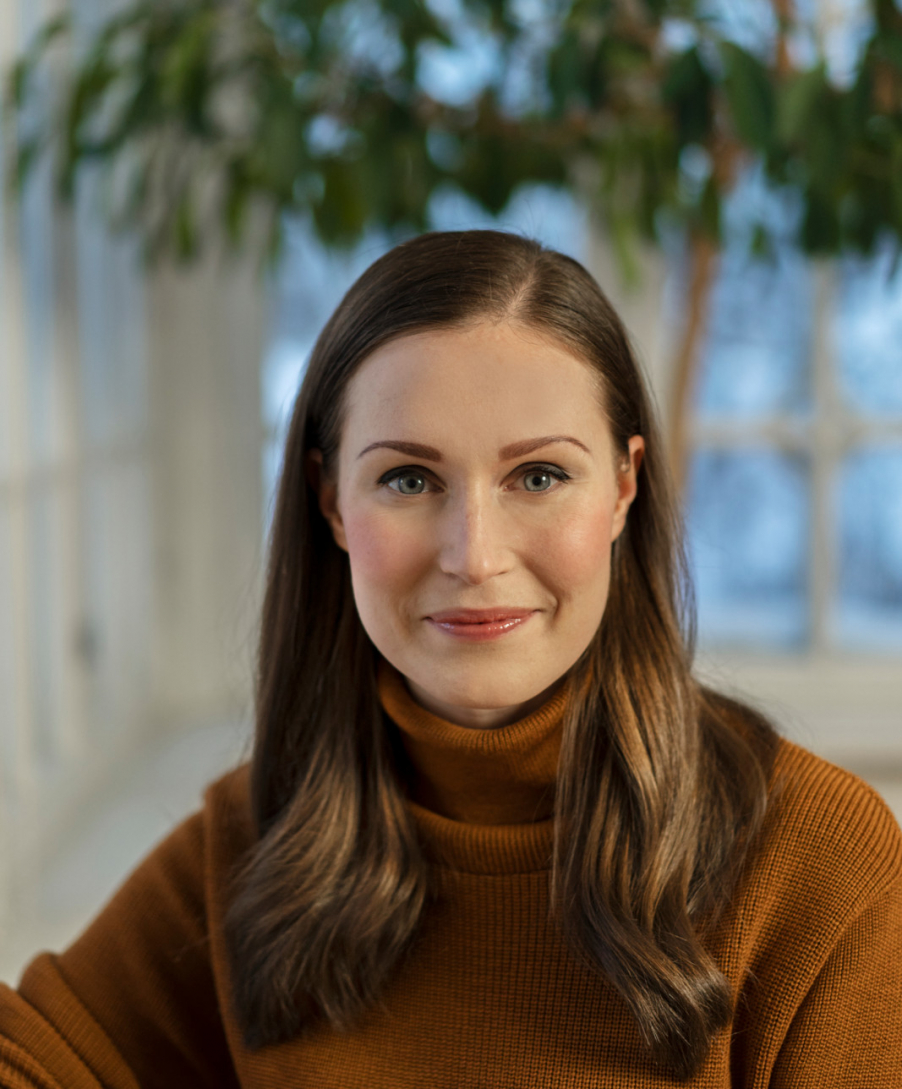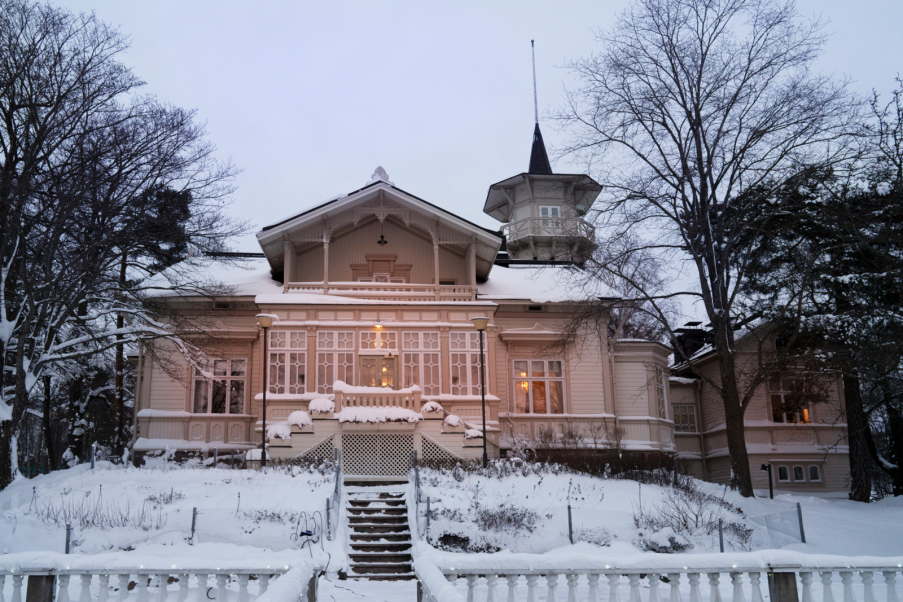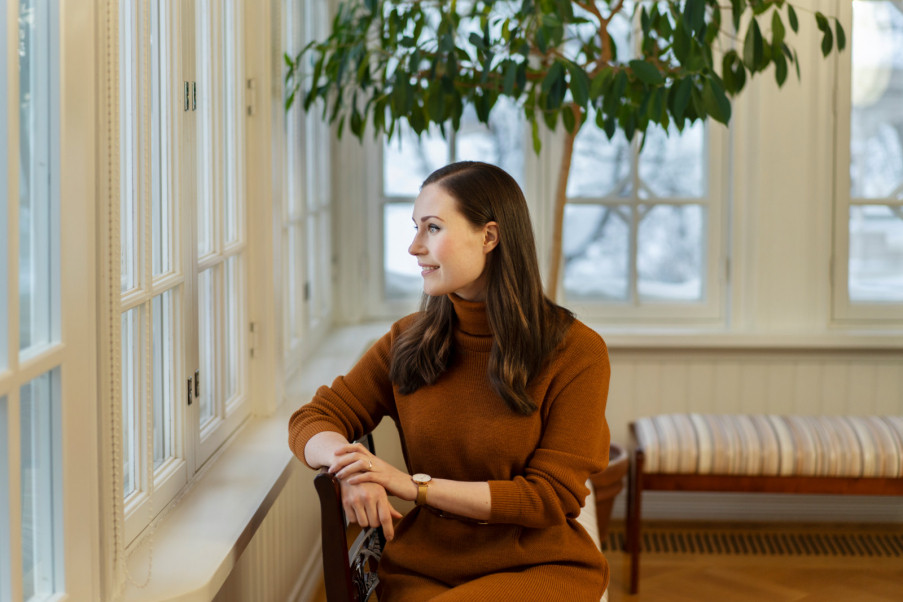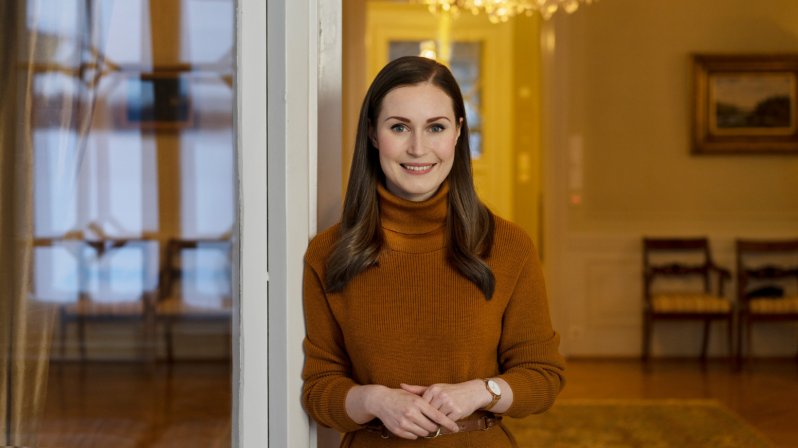Sanna Marin: “Female-dominated sectors keep this country going – both during an emergency and at other times too”
So far not much has been said about the fact that people can find themselves in very different situations due to the coronavirus crisis, says Prime Minister Sanna Marin. She wants to promote non-discrimination and equality in working life, in spite of the pandemic.
“Where do we take the pictures?” Sanna Marin asks. She quickly gets down to business. We do our introductions only after the photoshoot is set up.
It’s a clear, cold January afternoon. Outside it’s almost twenty degrees below zero, and Kesäranta in Helsinki’s Meilahti is covered in fluffy snow. The ornate villa, completed in 1873, has become well known as the prime minister’s official residence and as a venue for government negotiations and meetings. The walls are lined with historic paintings in thick frames and the windows look out over a wintry scene towards the sea.
The occupant of Kesäranta, Sanna Marin, became prime minister over a year ago in December 2019. For most of her term so far she has led the country in a state of crisis. This has meant long, irregular working days, often every day of the week, with the government tackling difficult decisions affecting citizens’ health, finances and employment.
The progress of the coronavirus pandemic and its effects have featured in discussions every day since last March. In Marin’s opinion, however, there is one thing that has not been talked about much so far.
“This pandemic has treated people working in different sectors and in different life situations in very different ways. Whilst some of us are struggling with a shared global pandemic, others are grappling with personal crises as well”, she says.
Several crises can hit the same family at once, like losing a job or a relative falling ill or passing away.
“Children and families also differ in their ability to adapt to remote studying and have different possibilities for remote working.”

In the front line of the crisis
People in service, social and healthcare sectors and those in educational sectors have been in the front line of the crisis. Most of them are women. Marin says the coronavirus crisis has highlighted the value of the work that is done in these sectors. A common feature of many jobs is that they cannot be done remotely.
“Female-dominated sectors keep this country going, both during an emergency and in normal times too”.
Marin admits that the government has had to make tough decisions on a range of restrictions affecting people’s lives. The restrictions have hit the cultural and hospitality activities and event organisers particularly hard.
She is especially concerned about those who have lost their jobs as a result of the crisis.
“We are trying to do all we can to keep the scale and duration of the economic damage to a minimum so that people can quickly get back into work”.
The pandemic was also a blow to equality
City councillor, city council chairman, member of parliament, SDP deputy chairman, minister of transport and communications, prime minister, SDP chairman. Over the last 15 years Sanna Marin’s job titles and elected positions have changed rapidly. The business magazine Forbes and the BBC have also ranked Marin as one of the 100 most influential women in the world.
Marin is known above all as a defender of equality. Now she is concerned that it is going backwards.
“This crisis has not just hit health and the economy, but also equality”, she says.
“In many countries the equality situation has deteriorated due to the coronavirus crisis and many groups of people have been left behind by the crisis.”
“In many countries the equality situation has deteriorated due to the coronavirus crisis and many groups of people have been left behind by the crisis.”
An example cited by UNESCO, the United Nations Educational, Scientific and Cultural Organisation, is that restrictions have put education on hold for hundreds of millions of children and youngsters and there has been a global increase in the risk of violence in families and by spouses.
Marin stresses that coronavirus shouldn’t lead to a permanent setback, and non-discrimination and equality must move forward in spite of everything.
“Finland must act internationally to reverse this trend.”

Towards more equal working life
Marin was working late in the evenings prior to the interview. It doesn’t show, however. She says she is a task-oriented person with good powers of concentration and is a sound sleeper – whatever the situation. These are characteristics that have helped her to cope in the nation’s most demanding roles. She has also been supported by her family.
“My daughter Emma brightens up our life and takes my thoughts away from work”, she says and smiles.
When Emma was born three years ago, Sanna Marin and her husband Markus Räikkönen shared their family leave. That isn’t all that common in Finland as yet since the majority of family leave is taken by mothers.
How then could we get more equality in working life?
“There are a number of ways to achieve that, and they should be brought in at the same time. One approach is family policy. We will be overhauling parental leave, the idea being that in future fathers and mothers will take family leave and parental leave more equally. And family policy more generally can support people in reconciling work and family in their everyday lives.
“Besides family policy there is the work that we can do to foster equality in other ways, for example by promoting transparency around pay, wage equality and acting on unjustified pay gaps”, she says.
Service sector work is done at all times of day, so the availability of public services outside office hours is a challenge many workers face.
“Society hasn’t run on a nine-to-five basis for a long time now. Day care is one example of the services that people need to make working possible and reconcile work and family life. For others, having public transport at different times of day can be important for getting to their workplace”, Marin says.
Decisions on day care and many other services are made in the municipalities, where new decision-makers will be elected in the municipal elections in April. Service sector workers can make an impact here too.
“I think it’s important that people from different sectors, genders and ages are represented among municipal decision-makers so that all perspectives are taken into account.”

Steps towards a sustainable future
Working life is undergoing big changes. Marin believes that we are at a turning point, especially when it comes to digitalisation. The most important thing for her, however, is to make sure that people can still make a living from work in the future.
“That’s the bottom line.”
In her opinion clear rules are also needed in working life so that action can be taken on the damaging tendencies that have been seen in service sectors too. Marin is well aware of these.
As an example, she mentions the situation of gig workers as well as the exploitation of foreign labour or work that is comparable to human trafficking.
“These tendencies are damaging from the point of view not just of society but also businesses. Honest businesses suffer if some operators act improperly.”
As well as fair working conditions, Marin would also like to make working life and society more environmentally sustainable.
It was environmental issues that provided the original impetus for her political career. There was no single moment or event, rather gradually over the years Marin got fed up with decision-makers at the time not moving fast enough in combating climate change. She also wanted to defend the Finnish welfare state.
”We can punch above our weight on the climate.”
“We have so much we should cherish! I wanted to play a part in ensuring that society continues to provide quality and equality for all, not just the few”, says Marin, explaining her thinking.
Now we are making progress, rapid progress, on the climate. Marin’s government has an ambitious target of making Finland a carbon-neutral and fossil-free society by 2035. In her opinion Finland can set an example for others by showing that it is possible at the same time both to combat climate change and create jobs and welfare.
“We can punch above our weight on the climate.”
Outside it is already dusk. Marin’s husband Markus Räikkönen and daughter Emma, dressed in pastel overalls, are playing in the snow and wave happily.
Emma stops to wave, turns round and jumps for joy. She seems to know that the rest of the prime minister’s evening is reserved for her.
By Minna Raitapuro



